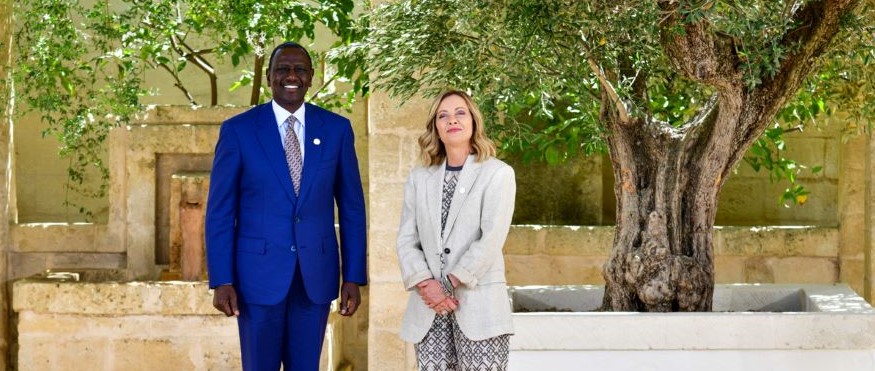The G7, comprising Canada, France, Germany, Italy, Japan, the United Kingdom, and the United States, is often viewed as an elite club of rich nations. However, the recently concluded G7 Summit in Borgo Egnazia, Italy, on June 15, 2024, attempted to give an inclusive touch more than any time before. Italian Prime Minister Giorgia Meloni reached out to leaders from several African countries, Argentina, Brazil, and India. This ‘expanded outreach’ particularly on Africa was to bridge the “West vs. the Rest” gap and build consensus on global issues. Importantly, the host Italy also had its agenda overarching that of G7.
Africa had become a central plank of Meloni’s foreign policy since she took office in late 2022. She named the Africa Policy as“Mattei Plan” after Eni’s (largest Italian corporation having massive investments in the continent, particularly in Northern Africa) founder Enrico Mattei. The initiative, which is yet to be pronounced in full, seems to be aimed at encouraging a holistic approach to dealing with African countries of interest to Italy. It also aims to turn Italy into an energy hub between North Africa and Europe. Through the construction of the new pipeline, the TransMed (Enrico Mattei) pipeline, which carries Algerian gas to Italy via Tunisia, Italy will get greater strategic importance. It will become an exporter of both natural gas and hydrogen to countries such as Germany and Austria and the gateway linking North Africa to Central and Northern European countries.
Political analysts opine that Meloni’s African Policy has both stated and unstated objectives. Stated policy, as evidenced by the number of trips that she had undertaken especially to Northern Africa is to make Italy the closest ally of Africa during the energy transition and to ensure economic activities snowballed to the rest of West Europe only through its intermediation. The unstated objective is to reverse the migrant flow from Africa into Europe, where all countries are at the receiving end. For the record, the G7 discussed the dangers posed by Artificial Intelligence (AI), But that was only for media headlines or to subterfuge the real objectives.
Well, as regards Africa, the G7 Summit this year in Italy, made some significant announcements. ‘Energy for Growth Initiative in Africa’ was a visible effort to help Africa develop bankable clean energy projects, attract Public-Private partnerships, encourage the flow of concessional finance, and overcome barriers to investments in clean energy across Africa.
G7 is also striving to provide an alternative to China’s Belt and Road Initiative. Multi-billion-dollar infrastructure projects are proposed across Africa, including the Lobito Corridor, with significant financial backing from the African Development Bank and G7 nations. Italy and the United States will collaborate on clean energy, sustainable agriculture, and e-mobility projects in Kenya.
Extensive attention was given to tackling irregular migration. G7 sought higher investment and funding for the African states to curtail migration to Europe. A three-pronged approach was adopted to address migration, focusing on root causes such as conflict and poverty, safe returns, and regular migration pathways.
To tackle food insecurity in Africa, the G7 introduced the Apulia Food Systems Initiative focussing on sustainable agriculture and investment in food systems. This included mobilizing finance for agriculture adaptation, using insurance schemes, debt-for-food swaps, and higher investment by development banks.
Despite the lofty proclamations, critics are sceptical about the realisation of these plans. Uncertainties and challenges abound. The political scenarios in most of the G7 members, particularly in the US and France are volatile. The prospect of a radical leadership change in both countries is anticipated. This raises doubts about the actualization of the decisions at the summit. For instance, if former President Donald Trump is elected, the outlook becomes very uncertain. The G7 was almost in a sleep mode during his earlier tenure. In short, Leadership changes in the G7 members may bring a paradigm shift in the orientation of Western policies.
Another challenge for Africa is the crucial need to develop bankable projects. Unless Africa evolves its capacity to develop bankable projects, the significant investment and financial commitments made by G7 will remain on paper.
Political analysts also attribute that the G7 is used as a tool for U.S. geopolitical dominance. They point out that the agenda is heavily tilted towards the U.S.’s strategic objectives to counter China and Russia which could impair geopolitical tensions and polarize global cooperation.
Overall, the G7 Summit in Italy reflected the group’s efforts to be more inclusive and, at the same time, address global challenges through strategic initiatives and cooperation. Yet, it is on a weak wicket. The success of its plans hinges on how the political scenarios in G7 emerge in the coming months.





